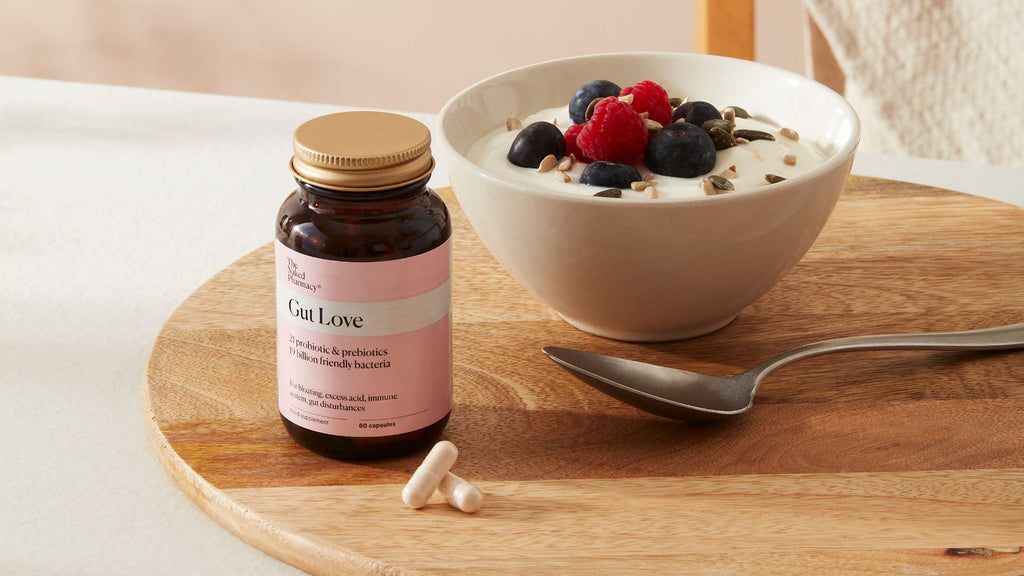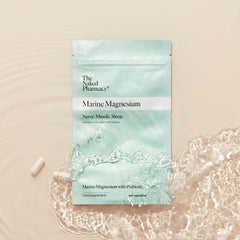Journal
Hay fever? No problem! Enjoy spring to the fullest with Natruflex Turmeric
What is hay fever?
Spring is here, and along with blooming flowers and the much-anticipated warmer weather comes the seasonal antagonist for many: hay fever.
Hay fever, also called allergic rhinitis, causes cold-like symptoms. These may include a runny nose, sneezing and itchy eyes. But unlike a cold, hay fever isn't caused by a virus, it is caused by an allergic response to a harmless outdoor or indoor substance the body identifies as harmful (allergen).
Allergens can be inhaled, ingested, or enter through the skin and trigger an immune response causing symptoms of hay fever.
Common allergens that can trigger hay fever symptoms include pollen and dust mites. Tiny flecks of skin shed by cats, dogs, and other animals with fur or feathers (pet dander) also can be allergens.
Pollen is a fine particle released by plants as part of their reproductive cycle. It contains proteins that can cause the nose, eyes, throat and sinuses to become swollen, irritated and inflamed.
You can have an allergy to:
- Tree pollen, released during spring.
- Grass pollen, released during the end of spring and beginning of summer.
- Weed pollen, released in late autumn.
Symptoms of hay fever
- Sneezing and coughing
- A runny or blocked nose
- Itchy, red or watery eyes
- Itchy throat, mouth, nose and ears
- Loss of smell
- Pain around the sides of your head and your forehead
- Rash
- Headache
- Feeling tired

When does hay fever season start and end?
Symptoms are usually worse between late March and September, especially when it's warm, humid and windy. This is when the pollen count is at its highest.
You can check the latest pollen count here
How do you know if it's hay fever or a cold?
As allergies and colds share many of the same symptoms, it can often be difficult to determine which you are suffering from.
Hay fever can last for weeks or months, unlike a cold, which usually goes away after 1 to 2 weeks. Symptoms of a cold may include a sore throat or fever whereas these are uncommon if you are suffering from hay fever.
Hay fever and the immune system
Symptoms of hay fever occur because the immune system perceives the allergens as harmful invaders and goes into defence mode.
- Immune system trigger: When someone with hay fever comes into contact with an allergen (like pollen), their immune system responds by recognising these particles as potential threats. In individuals sensitive to these allergens, the body's immune system treats them as if they were harmful pathogens, such as viruses or bacteria.
- Production of antibodies: The immune system produces immunoglobulin E (IgE) antibodies specific to the allergen. These antibodies are part of the body's adaptive immune response, designed to recognise and bind to the allergen upon future exposure. Each IgE antibody can be very specific, reacting against certain pollens and allergens. This means that a person can be allergic to one type of pollen, but not another.
- Activation of mast cells: The IgE antibodies attach to mast cells, which are a type of white blood cell found in great numbers in surfaces exposed to the external environment, such as the skin and mucous membranes in the nose. Mast cells are loaded with granules containing histamine and other chemicals.
- Release of histamine: When the allergen enters the body again and binds to the IgE antibodies on mast cells, it triggers the cells to release their contents, including histamine, into the surrounding tissues and bloodstream.
- Symptoms of hay fever: Histamine binds to receptors on nearby blood vessels and other cells. This binding causes the blood vessels to become more permeable, leading to leakage of fluid into the tissues, which causes swelling and contributes to typical hay fever symptoms like a runny nose, watery eyes, and sneezing. Histamine can also irritate nerve endings, leading to itchiness.

Who is most at risk of hay fever?
Research has found that 49% of the UK has had hay fever symptoms, affecting millions of individuals and making it one of the most common allergies.
Certain factors can make some individuals more susceptible to hay fever than others. Understanding who is at higher risk can help in prevention and management strategies. Here are key groups and factors that influence susceptibility to hay fever:
- Having asthma
- Having other allergies
- Having atopic dermatitis or eczema.
- Having a genetic predisposition to asthma or eczema.
- Younger children and adults are more likely to suffer from asthma and often symptoms improve with age.
- Living or working in an environment that constantly exposes you to allergens — such as pollen, animal dander or dust mites.
- Being exposed to smoke and strong odours that irritate the lining of the nose.
- Some alcoholic drinks, particularly beer and wine, contain histamine which can exacerbate allergy symptoms.
How to manage hay fever?
There is an increasing number of adults and children suffering from hay fever and its symptoms. Symptoms can sometimes be mild however some individuals can find it has a substantial impact on their day-to-day life – interfering with how well you perform at work or school.
Here’s what you can do to help make the most of spring and summer and minimise your symptoms.
Limit exposure to allergens
Stay indoors on high pollen days: Check daily pollen forecasts and try to stay indoors when pollen counts are high, typically on dry, windy days.
Close windows: To prevent pollen from entering your home or car, keep windows closed during pollen season and use air conditioning, if possible, which helps filter out pollen.
Use air purifiers: Consider using air purifiers with HEPA filters in your home, especially in bedrooms, to remove pollen, dust, and other allergens from the air.
Personal hygiene and clothing
Pollen can accumulate on your clothing and hair, so it’s advisable to change clothes and take a shower after returning indoors to remove any allergens.
Wear sunglasses and a hat to help keep pollen out of your eyes and off your hair.
Wash bedding regularly using hot water weekly to remove allergens.

Manage indoor air quality
Regularly vacuum with a HEPA-filter vacuum cleaner and dust with a damp cloth to reduce indoor allergens like dust mites and pet dander, which can exacerbate hay fever symptoms.
Control humidity using dehumidifiers to keep indoor humidity below 50% to help prevent the growth of mould, which can trigger symptoms.
Diet and medications
Stay hydrated: Drinking plenty of fluids can help thin nasal secretions, making it easier to breathe, and relieve a stuffy nose and irritated throat.
Regular use of a saline nasal spray can help rinse allergens out of your nasal passages and relieve congestion.
Antihistamines: These can help relieve sneezing, itching, a runny nose, and watery eyes by blocking histamine, the substance your body makes during an allergic reaction.
Decongestants: These can provide temporary relief from nasal stuffiness but should not be used for more than a few days without consulting a doctor.
Nasal corticosteroids: These sprays help reduce nasal inflammation and are most effective when used before symptoms start and regularly during the allergy season.
Over the counter or prescribed medications like antihistamines, decongestants, and corticosteroid nasal sprays can help alleviate hay fever symptoms. Some possible side effects of antihistamines include drowsiness, dizziness, dry mouth, blurred vision, and constipation.

While there are numerous over-the-counter options to help manage symptoms of hay fever, an increasing number of people are turning to natural remedies to avoid side effects and potential medication interactions.
Natruflex Turmeric
Natruflex Turmeric contains high-strength turmeric. It is the presence of the bioactive compounds known as curcuminoids which have been proven to have powerful anti-inflammatory properties.
Symptoms of hay fever such as sneezing, nasal congestions and sinus pressure are largely driven by inflammation caused by the immune system's response to allergens. Turmeric will help to mitigate this response by inhibiting certain pathways and enzymes in the body that lead to inflammation.
Natruflex Turmeric can be taken as a preventative therapy to stop the onset of symptoms as well as taken when symptoms are present to reduce their severity.
Adults and children (12+) can take ONE to TWO capsules daily depending on their symptoms.
For optimal results, our pharmacists recommend taking 1 capsule of Natruflex Turmeric daily before hay fever season starts (March) and continue throughout spring/summer to keep symptoms well controlled.

Gut Love
The gut microbiome, which is the ecosystem of bacteria and other microorganisms living in the digestive tract, plays a critical role in the development and function of the immune system.
As we now know, 70% of our immune system is located in the gut. It is therefore no surprise that a healthy gut microbiome will promote a balanced immune response, which can prevent overly aggressive reactions to non-harmful substances like pollen, thereby potentially reducing allergic responses.
Many factors can damage the balance of healthy bacteria in the gut such as stress, medications and illness. Gut Love contains 19 strains of healthy bacteria and will help to restore the balance of the gut microbiome.
Gut Love is our award-winning symbiotic supplement (containing pre and probiotics) that will help to support the gut microbiome and modulate our body’s immune responses by promoting tolerance to allergens and reducing the inflammatory response associated with hay fever.
Some studies have suggested that certain probiotics can reduce the symptoms of hay fever. For example, strains such as Lactobacillus paracasei, Lactobacillus fermentum, and others have shown potential in clinical trials to reduce eye and nasal symptoms of hay fever. Both of these strains can be found in Gut Love.
Our pharmacists recommend taking TWO capsules of Gut Love each morning with breakfast.
Rhinodoron
Rhinodoron is a natural nasal spray by Weleda designed to help provide relief from symptoms such as sneezing and nasal congestion.
The organic aloe vera and natural saline solution perfectly match the body's balance of sodium and potassium salts. So being 100% natural means Rhinodoron can be used safely over protracted periods for daily nasal hygiene and symptom relief.
It is suitable to use from the age of 3 months +.
Be prepared this spring/summer and be proactive to help significantly reduce the impact of hay fever on your daily life, helping you to enjoy the outdoors more comfortably during allergy season.
Call our pharmacist if you have concerns
Our expert pharmacists are always on hand to answer any questions you might have and to make tailored recommendations based on your individual needs. Please contact us for free health advice on:
@: pharmacist@thenakedpharmacy.com
T: 01483 685 630
Dimple Varu

Dimple is a pharmacist with 12 years of experience working in retail and general practice and now specialises in providing education and advice on natural supplements.
She believes in the power of nature and using natural existing compounds to enhance our health, whether that’s treating pain or helping to prevent long-term conditions. Mum of 1, living a busy life, loves reading and baking when she has the time.
Break the cycle - How probiotics and prebiotics can provide relief from IBS
Irritable Bowel Syndrome (IBS) remains one of the most common gastrointestinal disorders, affecting approximately 10% of the population.* It is characterised by a complex combination of causes, triggers and symptoms. IBS can significantly impact the quality of life of those affected and symptoms can last for days, weeks, or even months.
This blog aims to understand IBS, offering insights into its nature, causes, types, and various management strategies to help those affected navigate the condition more effectively.
What is IBS?
Irritable Bowel Syndrome (IBS) is a gastrointestinal disorder characterised by a group of symptoms that typically occur together. These include recurrent abdominal pain and changes in bowel habits such as diarrhoea, constipation, or a combination of both. IBS is a chronic condition that requires long-term management.
IBS vs IBD: The difference between irritable bowel syndrome (IBS) and irritable bowel disorder (IBD)
IBS and IBD are two conditions that affect the digestive system and are often confused due to their similar names and symptoms. Both are chronic conditions that cause abdominal pain, cramping, and urgent bowel movements. However, despite having similar acronyms and symptoms, these two conditions are very different in their nature, causes, and how they're treated. Here's a breakdown of the key differences:
| Irritable Bowel Syndrome (IBS) | Irritable Bowel Disease (IBD) |
| Classified as a syndrome, defined as a group of symptoms. | Classified as a disease. |
| Related to problems with how the gut works. It doesn't cause visible damage to tissues. | Often used to describe two chronic conditions: Crohn's disease and ulcerative colitis. These are autoimmune diseases are characterised by chronic inflammation of the gastrointestinal tract and can cause permanent harm to the intestines. |
| There is no sign of disease or abnormality during an exam of the colon. Diagnosis is usually made based on symptoms and after ruling out other conditions. | Diagnosis is made through a combination of tests, including blood tests, stool tests, endoscopy, and imaging studies to look for inflammation and damage. |
| Treatment focuses on symptom management and may include dietary changes (like following a low FODMAP diet), stress management, and medications to relieve specific symptoms. | Treatment aims to reduce inflammation, control symptoms, and maintain remission. This can include the use of anti-inflammatory drugs, immune system suppressors, and sometimes surgery. |
IBS is a functional disorder without visible damage to the digestive tract, primarily managed through symptom control and lifestyle changes. IBD, on the other hand, involves chronic inflammation and can cause significant damage to the GI tract, requiring more specific and sometimes aggressive treatment to manage inflammation and prevent complications.
Symptoms of IBS

The symptoms of IBS vary between individuals and affect some people more severely than others. Symptoms can become worse, often during times of stress or after eating certain foods.
Some of the symptoms of IBS ease after going to the toilet:
- Stomach pain and cramping
- Change in your bowel habits – such as diarrhoea, constipation or sometimes both
- Bloating
- Excessive wind
- Occasionally experiencing an urgent need to move your bowels
- Fatigue
- Nausea
- Heartburn
- Back pain
What causes IBS?
Although the exact cause of IBS remains unclear, it is believed to be a result of multiple factors, including alterations in gut motility and food passing through the gut too quickly or slowly, hypersensitivity in the gut and abnormalities in the gut microbiome. Psychological factors such as stress and anxiety can also play a significant role in exacerbating the symptoms.
Often, IBS is referred to as a disorder of the gut-brain interaction and has to do with problems with how our gut and brain coordinate to help our digestive system work. The butterflies you experience in your stomach when you’re nervous or the sinking feeling when you get anxious highlights the strong connection between our emotions, thoughts, and digestion.
Common triggers of IBS

Identifying and avoiding triggers is a key strategy in managing IBS. Common triggers include:
- Dietary factors: Certain foods and drinks can exacerbate symptoms.
- Stress: High-stress levels are known to trigger flare-ups.
- Hormonal changes: Many individuals report a worsening of symptoms during menstrual periods, perimenopause and menopause.
Different types of IBS
IBS is classified into three main types, based on the predominant bowel habit.
- IBS with constipation (IBS-C)
- IBS with diarrhoea (IBS-D)
- IBS with mixed bowel habits (IBS-M)
Understanding the type of IBS is crucial for tailoring treatment effectively.
How is IBS diagnosed?
There is no specific test for IBS. Diagnosis typically involves a process of elimination to rule out other causes of the symptoms. After ruling out other conditions through tests such as blood tests, stool tests, and colonoscopy, IBS is diagnosed if no other cause is found.
How long does IBS last?
IBS is a chronic condition, meaning symptoms can last for years or even a lifetime. However, symptoms can change over time and many people can manage their symptoms effectively with treatment and lifestyle adjustments.
Who is at risk for IBS?
Those more likely to be at risk for IBS are:
• Younger people: most people first get IBS before they are 45 years old.
• Women: women get IBS almost twice as often as men.
• Have had recent gastroenteritis.
Link between IBS and menopause
Hormonal fluctuations during menopause can affect gastrointestinal function, potentially exacerbating IBS symptoms. Some women report the onset or worsening of IBS symptoms during this period.
Treatment for IBS
Treatment is typically multifaceted, including:
Medications: Different medicines are used for IBS, depending on the symptoms. These include medicines to prevent constipation, diarrhoea, pain, and spasms.
Psychological Therapies: Stress management strategies like cognitive behavioural therapy (CBT) can be effective.
Dietary Adjustments: Tailoring the diet to minimise consuming foods that trigger symptoms. In some cases, a high-fiber diet can reduce symptoms.
Probiotics: To help restore and balance the gut microbiome.
Regular exercise: Helps to reduce stress and can promote bowel function.
Adequate sleep: Essential for overall health and stress management.

What is a FODMAP diet?
Diet plays a crucial role in managing IBS. FODMAP is an acronym that stands for fermentable oligosaccharides, disaccharides, monosaccharides, and polyols. These are small carbohydrates that are difficult to digest and can be fermentable by bacteria in the gut, leading to increased gas, bloating, and other IBS symptoms.
A low FODMAP diet involves reducing the intake of these carbohydrates and is effective for many people with IBS.
Examples of FODMAPs:
- Oligosaccharides: garlic, onions, legumes, and wheat.
- Disaccharides: mainly sucrose, lactose (mostly in dairy products), and maltose.
- Monosaccharides: simple sugars such as fructose and glucose found in fruit, honey, and sugary drinks.
- Polyols: found in stone fruits, many sugar-free sweeteners, and some vegetables like mushrooms.
Food high in FODMAPs:
| Fruits | Grains | Vegetables | Legumes |
| Apples | Barley | Artichoke | Almonds |
| Apricots | Couscous | Asparagus | Baked Beans |
| Blackberries | Rye | Beets | Black Beans |
| Cherries | Semolina | Brussels Sprouts | Black-Eyed Peas |
| Figs | Wheat | Butternut Squash | Broad Beans |
| Mango | Cauliflower | Cashews | |
| Nectarines | Fennel | Chickpeas | |
| Peaches | Garlic | Kidney Beans | |
| Pears | Leeks | Lentils | |
| Plums | Mushrooms | Pinto Beans | |
| Prunes | Onions | Pistachios | |
| Pomegranates | Soybeans | ||
| Split Peas |
Food low in FODMAPs:
| Fruits | Grains | Vegetables | Nuts & Seeds |
| Banana | Brown Rice | Aubergine | Almonds |
| Grapes | Buckwheat | Bean Sprouts | Brazil Nuts |
| Kiwi | Maize | Bok Choy | Chia Seeds |
| Lemon | Millet | Cabbage | Hazelnuts |
| Limes | Oats | Carrot | Macadamia Nuts |
| Oranges | Polenta | Choy Sum | Peanuts |
| Papaya | Quinoa | Cucumber | Pecan |
| PassionFruit | Tapioca | Green Bell | Pine Nuts |
| Pineapple | Pepper | Pumpkin Seeds | |
| Rhubarb | Kale | Sesame Seeds | |
| Strawberry | Lettuce | Walnuts | |
| Okra | |||
| Tomato | |||
| Spinach | |||
| Yam |
Probiotics & the gut microbiome
The gut microbiome is the name for the trillions of microbes that live in our gut. Research has shown that the health of our gut microbiome has a profound impact on our overall health and holds a connection with our brain, skin and immune system. It is therefore no surprise that the gut microbiome plays an important role in IBS.
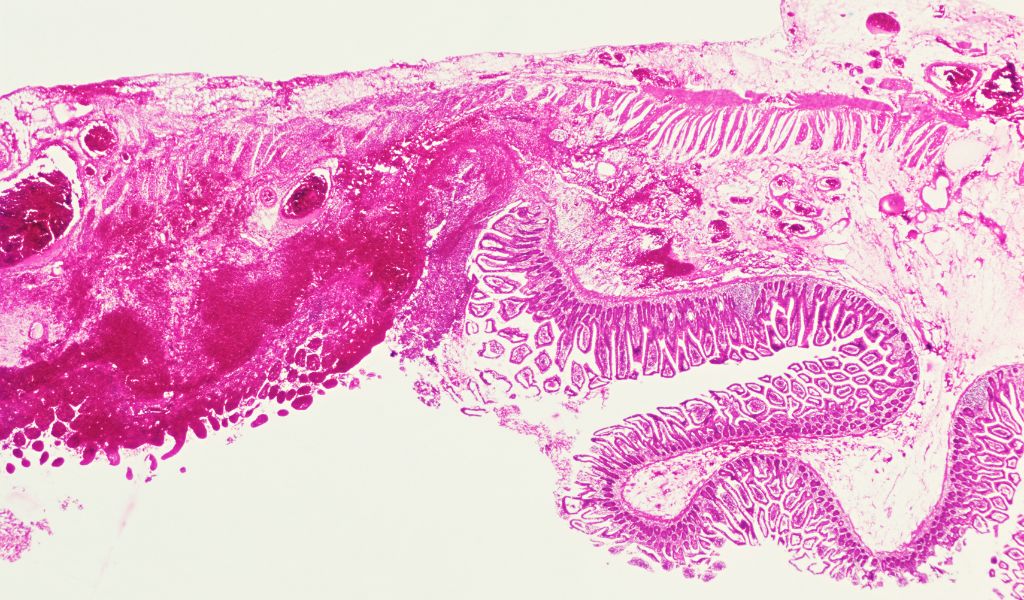
Probiotics are live microorganisms, often referred to as "good" or "friendly" bacteria. They are found in fermented foods like yogurt, kefir, and supplements. Many factors can cause an imbalance of the healthy bacteria in the gut such as antibiotics, stress, illness, and lifestyle. When an imbalance occurs, known as dysbiosis, gastrointestinal disorders such as IBS can occur.
Therefore, by re-balancing the gut microbiome with probiotics, you can help restore the balance of intestinal flora, improving gut motility, immune function, and immune response.
The NHS recommends that probiotics can be used to help manage the symptoms of IBS and that they should be continued for at least 4 weeks.
Several strains of probiotics have been studied for IBS, with some showing promise in alleviating symptoms such as bloating, gas, and abdominal pain. Commonly researched strains include Lactobacillus, Bifidobacterium, and Saccharomyces boulardii.
Prebiotics
Prebiotics primarily serve as food for the friendly gut bacteria, helping to nourish and allow them to thrive. This, in turn, helps to improve the overall health of the gut microbiome, which we know is closely linked with digestive and gut health.
As highlighted above, IBS has a broad range of symptoms. It is important to look for supplements containing probiotic strains that have been found to offer benefits for IBS. Look for a high-quality daily supplement for all-round gut support.
What makes a good probiotic supplement?
We know that the market is saturated with hundreds of different probiotics and it can often be a minefield to navigate. Here’s what to look for to ensure you are choosing the best probiotic for you:
- Multi strain: different probiotic strains have different effects on health. Some strains can be beneficial for general gut health, while others are specifically targeted for conditions like IBS and immune health. Looking for supplements that have included a variety of strains will have the biggest positive impact on your gut health.
- CFU count: CFU stands for colony-forming units, which indicate the number of live and viable microorganisms in a probiotic. While higher CFU counts are often thought to be more effective, the optimal count depends on the specific strain and the health condition being targeted. Some conditions might benefit from a higher CFU count, while for general maintenance, a lower count might be sufficient.
- Prebiotics: prebiotics, are fibres that feed the beneficial bacteria in your gut. This combination, often referred to as a symbiotic, can enhance the probiotic's effectiveness.
- Delivery to the gut: probiotics are very delicate and easily damaged by stomach acid. It is important to ensure the probiotic you are taking reaches the gut where it is most beneficial.
- Stability: some probiotics need to be refrigerated to maintain their potency, while others are shelf-stable due to special formulations or packaging. Always check the label for storage instructions.
- Purity: look for supplements that do not contain unnecessary additives and bulking agents that may negatively impact your symptoms. Some probiotics may even contain dairy, soy, gluten, or other common allergens.
Gut Love
Gut Love is our pre and probiotic supplement designed to help restore the balance of healthy bacteria within the gut.
It contains 19 strains of healthy bacteria and 2 strains of prebiotics providing 19 billion CFU per two capsules.
One of the prebiotics in the formulation, slippery elm, also provides stability to the formulation and ensures delivery of the probiotics to the gut. It creates an emulsion barrier around the probiotics ensuring they reach the gut safely.
Gut Love does not need to be refrigerated and should be stored in a cool, dry location away from direct sunlight.
It is dairy and gluten-free and free from any other synthetic additives and ingredients.
Gut Love is an effective treatment choice for individuals suffering with IBS. It will help to restore the balance of healthy bacteria in the gut and reduce symptoms such as bloating, cramps, and irregular bowel habits as well as strengthen your immune system.
Understanding and managing IBS requires a comprehensive approach, involving dietary and lifestyle adjustments, stress management, and sometimes medication. Each individual’s experience with IBS is unique, and finding what works best for you might take time and experimentation.
Call our Pharmacists if you have concerns
Our expert pharmacists are always on hand to answer any questions you might have and to make tailored recommendations based on your individual needs. Please contact us for free health advice on:
@: pharmacist@thenakedpharmacy.com
T: 01483 685 630
Dimple Varu

Dimple is a pharmacist with 12 years of experience working in retail and general practice and now specialises in providing education and advice on natural supplements.
She believes in the power of nature and using natural existing compounds to enhance our health, whether that’s treating pain or helping to prevent long-term conditions. Mum of 1, living a busy life, loves reading and baking if she has the time.
Clear the mist - How to combat brain fog
Many of us have experienced moments where our mind feels clouded, making concentration and memory recall more challenging than usual. This is commonly referred to as brain fog and can be very frustrating to deal with. While it’s not a medical diagnosis in itself, brain fog is a symptom that can significantly impact your quality of life.
What is brain fog?
Severe brain fog can be debilitating, particularly if you need to function day-to-day in a high-performance or pressured environment at home or work. It can affect your levels of confidence, self-esteem and performance.
Brain fog causes
Many factors can contribute to brain fog such:
Lifestyle Factors: Poor sleep quality, lack of exercise, and a nutrient deficient diet.
Medical Conditions: Chronic fatigue syndrome, fibromyalgia, anaemia, depression, thyroid disorders. diabetes and post viral syndrome are among the conditions associated with brain fog.
Medications: Certain medications can affect cognitive function as a side effect.
Stress and Mental Health: High-stress levels and mental health issues like anxiety and depression are closely linked to brain fog.
Other factors that can affect brain fog are age, hormonal changes, nutritional deficiencies, and even the aftermath of conditions such as COVID.
Brain fog symptoms
Brain fog manifests as cognitive impairments including:

- Mood swings
- Lack of focus
- Irritability
- Confusion
- Trouble sleeping,
- Low energy or fatigue
- Forgetfulness
- Trouble concentrating
- Low motivation
- Difficulty making decisions
Menopause brain fog
Brain fog during perimenopause and menopause is a real and sometimes challenging symptom faced by many going through the hormonal transition.
Hormonal fluctuations - particularly a decrease in oestrogen and testosterone - are believed to play a critical role in this. When the levels of these hormones begin to fall during perimenopause and menopause, you can experience a range of cognitive symptoms including memory loss, difficulty staying focused, losing your train of thought, and getting confused easily.
Oestrogen is involved in regulating neurotransmitters that affect cognition, including serotonin and dopamine. As these hormone levels fluctuate, so does the clarity of thought, making brain fog a frequent complaint amongst menopausal women.
Testosterone strengthens nerves in the brain and contributes to mental sharpness and clarity, as well as overall energy levels. It also strengthens arteries that supply blood flow to the brain, which is crucial to protect against loss of memory.
Brain fog is very common. In research conducted by the British Menopause Society, almost 40% of the women interviewed reported issues with memory and concentration as they go through the menopause.*
*Menopause - Understanding the impact on women and their partners.
The COVID connection
Post-COVID brain fog has emerged as a lingering symptom for many individuals recovering from the virus due to consequences such as inflammation and the overall stress of dealing with the illness.
In one study, 7.2% of people who reported having long COVID experienced brain fog, and this symptom was more common in those who had a more severe case of COVID-19.
Stress

Chronic stress can increase blood pressure, weaken the immune system, and trigger depression. According to a study undertaken in 2017, stress can also cause mental fatigue.
Chronic stress leads to sustained high levels of cortisol, the body's stress hormone. High cortisol levels can impair cognitive function such as memory and concentration, contributing to brain fog.
Stress can also disrupt the balance of neurotransmitters, such as serotonin and dopamine, which play crucial roles in mood regulation, focus, and cognitive processing. Imbalances in these chemicals can lead to difficulties in concentrating and memory lapses.
Chronic stress is linked to increased inflammation in the body, which can negatively affect brain function and lead to symptoms of brain fog.
Medications
Brain fog is a known side effect of certain medications, such as certain painkillers, antidepressants and sleep medications.
Brain fog can also occur after cancer treatments. This is often referred to as ‘chemo brain’.
Sleep
The NHS recommends that adults should aim for 7 – 9 hours of sleep each night. However, Nuffield Health surveyed 8,000 adults in the UK and found that most adults are getting an average of 5.9 hours of sleep every night in 2023.
Poor sleep quality and sleep deprivation can significantly contribute to cognitive impairments, including reduced attention span, memory issues, and decreased mental clarity.

How to clear the fog
Brain fog can be frustrating, but relief is possible. You should not ignore your symptoms because, if left untreated, brain fog can impact your ability to function and undertake tasks.
Addressing brain fog involves treating underlying causes or making lifestyle changes to improve cognitive function, these include:
Sleep: Ensuring adequate, high-quality sleep can significantly reduce symptoms of brain fog. Aim for 7-9 hours per night and maintain a consistent sleep schedule.
Nutrition: A diet rich in fruits, vegetables, whole grains, and omega-3 fatty acids (found in fish) can support brain health. Avoiding excessive alcohol, sugar, and processed foods is also advisable.
Exercise: Regular exercise increases blood flow to the brain and has been linked to improved cognitive function. Activities like walking, swimming, and yoga can be particularly beneficial.
Stress Management: Techniques such as mindfulness, meditation, and yoga can reduce stress and improve mental clarity.
Hydration: Adequate hydration is crucial for maintaining cognitive function. Aim for 8 glasses of water daily.
Mental Stimulation: Engage in activities that challenge your brain, such as puzzles, learning a new skill, or reading.
Magnesium
Magnesium is an essential nutrient that plays a pivotal role in over 300 physiological processes in the body, including those involved in energy production, sleep quality, and the regulation of neurotransmitters. It’s, therefore, no wonder that magnesium has been identified for its potential to alleviate brain fog.
Magnesium aids in improving brain function by supporting the nervous system, enhancing sleep quality, reducing inflammation, and reducing stress levels—all factors that can mitigate the symptoms of brain fog. For those individuals navigating menopause, magnesium's role in balancing hormones further highlights its significance.
Marine magnesium supplements
Marine Magnesium can help to restore clarity for anyone experiencing brain fog. Our bodies require this micromineral to function healthily however our bodies do not synthesise or store magnesium. It is therefore essential that we get an adequate daily intake from our diet or high-quality food supplements.

“There are so many magnesium supplements on the market, which one should I choose?”
We understand how overwhelming it can be when deciding on which Magnesium supplement you should be taking. The key to selecting the most suitable supplement lies in understanding the difference in the quality and purity of the different supplements available.
Our Marine Magnesium is sourced from purified seawater and is in the form of magnesium hydroxide. Due to its natural and pure source, it is quickly absorbed by the body making it more effective and very gentle on the stomach.
Marine Magnesium contains only 3 ingredients:
- Magnesium (from seawater)
- Organic baobab (natural prebiotic)
- A natural, tapioca capsule shell.
Most other magnesium supplements such as magnesium glycinate, citrate, picolinate and taurate are synthetic and manufactured using chemicals and often contain numerous additives, fillers and bulking agents.
Like your food, it is best to avoid supplements that are overprocessed and contain unnecessary additives that can often affect the supplement's effectiveness and even be harmful to health. Remember to always read ingredient labels to help you choose your supplements wisely - choose NAKED.

Best magnesium supplement
Marine Magnesium has been voted as one of the best magnesium supplements by experts in The Independent. Maz Packham, a nutritionist says:
This supplement (Marine Magnesium) is made from pure seawater plus it has added prebiotic to support the gut. The only other ingredient is its tapioca shell.
Best magnesium supplements, approved by experts | The Independent
Shop Marine Magnesium now
Call our Pharmacists if you have concerns
If you have any concerns about brain fog or any other health conditions, please call our pharmacists for free advice. (+44) 01483 685 630
Dimple Varu

Dimple is a pharmacist with 12 years of experience working in retail and general practice and now specialises in providing education and advice on natural supplements.
She believes in the power of nature and using natural existing compounds to enhance our health, whether that’s treating pain or helping to prevent long-term conditions. Mum of 1, living a busy life, loves reading and baking if she has the time.
Preventing Heartache: Sugar Intake And Your Cardiovascular Health
Many of us often find it difficult to resist the sweetness of sugar. However, it is no secret that sugar has a bad reputation when it comes to our health. While its immediate gratification is undeniable, the long-term effects of regular high sugar consumption are concerning, especially when considering our health.
Consuming too much sugar increases our risk of tooth decay, weight gain and diabetes. However, sugar is often overlooked when it comes to our heart health. It not only increases the risk of premature heart disease, heart attacks and stroke but can also reduce life expectancy.
Research consistently shows a direct correlation between excessive sugar intake and key risk factors for heart disease, including high blood pressure and abnormal cholesterol levels.
Understanding what sugar does to our bodies can help us make better choices that lead to longer, healthier lives.
Understanding Sugar
Before recognising the effects of sugar on the heart, it is essential to understand what sugar is. Sugar is a simple carbohydrate that the body uses for energy.
There are two primary types of sugar: naturally occurring sugars found in fruits, vegetables, and dairy and added sugars. Added sugars are introduced to foods during processing, cooking, or at the table.
Consuming whole foods that contain natural sugar is okay. Fruits and vegetables also have high amounts of fibre, essential minerals and antioxidants. Since our bodies digest these foods slowly, the sugar in them offers a steady supply of energy to our body.

What Are Free Sugars?
Free sugars refer to all sugars that are added to foods and drink, as well as sugars naturally present in honey, syrups and fruit juices. This term does not include sugars found naturally in fruits, vegetables and milk because these foods do not have the same negative health effects as foods and drinks with added sugars.
The NHS and other health organisations recommend limiting the intake of free sugars to reduce the risk of obesity, type 2 diabetes, heart disease, certain cancers, tooth decay, and other health issues. The NHS recommends that free sugars contribute to no more than 5% of the energy (calories) you get from food and drink each day. This is equivalent to 30g of free sugars each day (7 teaspoons).
The consumption of added sugars has been rising globally, paralleling an increase in heart disease rates. Figures show that the average adult in the UK is consuming twice the recommended amount of free sugars daily. Most of which comes from soft drinks, jam and chocolate spread, biscuits, pastries and cakes.
While sugar itself is not inherently bad, excessive intake can lead to various health issues, including heart disease.
Weight
We all know that excessive sugar intake can lead to weight gain and obesity. Obesity is a significant risk factor for heart disease.
Everyone needs some body fat to stay healthy. But too much, particularly around the waist, puts your health at risk. Visceral fat is the type of fat that sits around the organs such as our liver and heart and it is associated with increased blood pressure, high cholesterol levels, type 2 diabetes, insulin resistance and non-alcoholic fatty liver disease. All of these conditions strain the heart and can lead to cardiovascular complications.
Weight gain and obesity can be influenced by:
- Medical conditions
- Medication
- Genetic make-up
- Stress
- Lack of sleep
- Diet
Insulin Resistance
Insulin is the hormone that controls your blood sugar. Consuming large amounts of sugar can lead to insulin resistance, a condition where the body's cells become less responsive to insulin. This causes the liver to store more fat and can lead to the development of non-alcoholic fatty liver disease (NAFLD).
Type 2 Diabetes
Type 2 diabetes can cause elevated blood sugar levels as glucose accumulates in the bloodstream instead of being used for energy. Type 2 diabetes is a major risk factor for heart disease, as it accelerates the development of the condition, atherosclerosis.
Atherosclerosis is where your arteries become narrowed due to a build-up of plaque, making it difficult for blood to flow through them and increasing the risk of high blood pressure, heart attacks and stroke.
Inflammation
High sugar intake can trigger inflammation in the body. Inflammation is another key player in the development of atherosclerosis.

Cholesterol
Lipids are fat-like substances found in our blood and body tissues. Our body needs small amounts of lipids to work normally. Cholesterol is the main lipid found in our bodies and it is made up of different parts such as:
- LDL (bad) cholesterol, is the main lipid that causes damaging build-up and blockage in our arteries.
- HDL (good) cholesterol helps to remove the extra LDL cholesterol and prevent cholesterol from building up in your arteries.
- Triglyceride is another lipid that may increase your risk for heart disease.
Consuming too much sugar can lead to increased levels of LDL cholesterol and triglycerides while decreasing HDL levels. This lipid profile is associated with an elevated risk of heart disease.
Non-Alcoholic Fatty Liver Disease (NAFLD)
Sugar is broken down by the liver, where it is converted into fat through a process called lipogenesis. Excess dietary sugar can lead to an accumulation of fat in the liver cells, contributing to the development of NAFLD.
Causes Of High Blood Pressure
Although salt intake is more commonly associated with high blood pressure, chronic high sugar levels can also contribute to raised blood pressure. High sugar intake can lead to weight gain and inflammation, both of which can increase blood pressure.
Do You Know What Health Targets You Should Be Aiming For?

We often judge our health based on our weight and the numbers we see on a scale.
However, the journey to a healthier heart (and body) starts by reviewing our body composition and understanding how excessive sugar consumption can affect us on the inside and not only focus on how we look and feel on the outside.

What Is Body Mass Index?
The body mass index is a measure that uses your height and weight to calculate if your weight is healthy.
Cholesterol
LDL cholesterol used to be the main measure of harmful types of cholesterol, but we now know that other forms of non-HDL cholesterol is also bad for our health, and this is what the healthcare professionals test for.
The more one's energy comes from sugar, the higher the risk of cardiovascular disease.*
* Associations between carbohydrates and cardiovascular disease risk, Kelly et al, 2023
Heart and circulatory diseases cause a quarter of all deaths in the uk.*
Preventing High Sugar Levels: A Healthy (Heart) Choice
As highlighted above, the effects of high sugar levels can trigger high blood pressure, cholesterol, inflammation, weight gain, diabetes, and non-alcoholic fatty liver disease. All of these factors can contribute to an increased risk of heart attack and stroke.
The relationship between sugar and heart health is complex, but the evidence is clear: excessive sugar intake poses a significant risk to heart health. So, what can you do to reduce your risk factors?

Read Food Labels
Look for added sugars under names like sucrose, fructose, dextrose, and maltose. Choose products with little to no added sugars.
Limit Sugary Drinks
Sugary drinks, including soft drinks, juices, and sweetened teas, are major sources of added sugars. Opt for water, unsweetened teas, or sparkling water as healthier alternatives.
Choose Natures Sweet Treats
When you need a sweet fix, select natural sources like fruits. Fruits not only provide natural sugars but also come packed with fibre, vitamins, and minerals.

Cook At Home
Cooking at home allows you to control the amount and type of sugar in your meals. Experiment with reducing the sugar in recipes and using spices like cinnamon and vanilla to add sweetness.
Metabolic Gold
Metabolic Gold is our natural supplement formulated by expert pharmacists using high-strength bergamot fruit extract and artichoke leaf extract. These two botanical ingredients work harmoniously together to improve sugar control, balance cholesterol, support weight management and optimise liver health.
Both of these ingredients are rich in naturally occurring polyphenols that have been proven to change the way our bodies process, bind and store fats. We have also incorporated organic baobab (a natural prebiotic) to help promote gut health.
Taking one capsule twice a day with food will help to reduce your cardiovascular risk factors and support your metabolic health.
Shop Metabolic Gold Now
Call Our Pharmacist If You Have Concerns
If you have any concerns about your cardiovascular health or your health risks in general, please call our pharmacists for free advice. (+44) 01483 685 630
Dimple Varu

Dimple is a pharmacist with 12 years of experience working in retail and general practice and now specialises in providing education and advice on natural supplements.
She believes in the power of nature and using natural existing compounds to enhance our health, whether that’s treating pain or helping to prevent long term conditions. Mum of 1, living a busy life, loves reading and baking if she has the time.
The bittersweet truth – The effects of sugar on the brain
What is Alzheimers disease?
 In our lifetime, one in two of us will be affected by dementia whether this is through caring for someone with the condition, developing it ourselves, or both. The NHS defines Alzheimer's disease a progressive neurodegenerative disorder that primarily affects older adults, typically becoming noticeable after the age of 65. The symptoms of Alzheimer's disease worsen over time and can be divided into early, middle, and late stages.
In our lifetime, one in two of us will be affected by dementia whether this is through caring for someone with the condition, developing it ourselves, or both. The NHS defines Alzheimer's disease a progressive neurodegenerative disorder that primarily affects older adults, typically becoming noticeable after the age of 65. The symptoms of Alzheimer's disease worsen over time and can be divided into early, middle, and late stages.(NHS Alzheimers Disease Symptoms)
Dementia is not a specific disease but is a general term used to describe a group of symptoms that affect the ability to think, remember, and perform everyday tasks. Alzheimer's disease is the most common type of dementia.
Alzheimers disease symptoms
In the early stages, subtle memory lapses manifest as forgetfulness about recent conversations, misplacement of items, and difficulty recalling names and objects.
Additional symptoms include impulsive behavior, delusions, speech and language problems, disturbed sleep, and changes in mood. Individuals often require support for daily activities as cognitive decline accelerates. In the later stages, full-time care becomes a necessity.

Deaths registered in England and Wales -ONS UK
What is type 3 diabetes?
Evidence shows that poorly controlled blood sugar can increase the risk of developing Alzheimer’s Disease. This relationship is so strong that Alzheimer’s disease is often referred to as diabetes of the brain or Type 3 diabetes.
Insulin resistance
Insulin is vital for glucose regulation and plays a crucial role in maintaining cognitive function. However, when the brain becomes resistant to insulin, it struggles to utilise glucose effectively, potentially contributing to the development and progression of Alzheimer's disease.
Does sugar cause inflammation?
Excessive sugar intake has been implicated in chronic inflammation throughout the body, and the brain is no exception. Neuroinflammation, triggered by the body’s response to poorly controlled sugar levels, is now recognised as a potential contributor to Alzheimer's disease. The inflammatory response in the brain can lead to the formation of beta-amyloid plaques, a hallmark of Alzheimer's.

Symptoms of too much sugar in your body
It's important to note that the body reacts differently to sugar depending on individual health, metabolism, and the amount and type of sugar consumed. Here are some common symptoms associated with excessive sugar intake:
- Weight gain: high sugar intake, especially from sugary drinks, can contribute to weight gain due to its high calorie content and its ability to increase hunger and craving for more sugary foods.
- Low energy: consuming a lot of sugar can cause rapid spikes in blood sugar levels, followed by sharp drops, which can lead to feelings of fatigue, irritability, and hunger.
- Dental problems: sugar is a leading cause of dental cavities and gum disease as sugar feeds the harmful bacteria in the mouth.
- Mood changes: excessive sugar consumption can lead to mood swings, irritability, and may even contribute to symptoms of depression and anxiety.
- Skin issues: high sugar diets can exacerbate skin conditions such as acne and can contribute to premature aging of the skin.
- Fatty liver disease: excessive intake of fructose, a type of sugar, can lead to a build-up of fat in the liver, which can progress to non-alcoholic fatty liver disease.
- Impact on Sleep: High sugar consumption, especially close to bedtime, can interfere with your ability to have a restful night's sleep.
The scientific evidence
A 2021 study involving 1865 adults over 19 years found a higher risk of Alzheimer's, all types of dementia, and stroke in people who consumed the most sugar, especially in the form of drinks.
A study with 37,689 people found a link between high sugar intake and increased Alzheimer’s risk among women.
A review undertaken in 2022 found that people with type 2 diabetes are up to 90% more likely to develop Alzheimer’s disease or another type of dementia.
A 2022 study with 4,932 people found that the link between Alzheimer’s, high blood sugar, and high cholesterol can begin as early as age 35. Researchers followed the participants over decades. They found that managing cholesterol and blood sugar levels early may help lower the risk of developing Alzheimer’s later.
Metabolic Gold
Metabolic Gold is our natural supplement formulated using pure artichoke leaf extract and bergamot fruit extract. These two botanicals contain bioactive compounds that provides effective support to help control sugar levels and therfore reduce your risk of dementia.
Metabolic Gold will help to improve sugar metabolism, reduce insulin resistance and restore normal cholesterol balance and weight management.

How does Metabolic Gold work?
Metabolic Gold will help to regulate the enzyme, alpha-glucosidase, which is involved in the breakdown of complex carbohydrates into simpler sugars. By inhibiting this enzyme, you can slow down the absorption of glucose from the digestive tract, leading to more stable blood sugar levels.The cholesterol-lowering effects are achieved through stimulating bile flow which in turn helps to break down, bind and excrete excess cholesterol from the body.
Here at The Naked Pharmacy we ensure all of our supplements are formulated using scientific evidence to ensure that they are safe and effective. Here is some trial data to support the use of Metabolic Gold to help manage your sugar levels and reduce the risk of dementia.
A study undertaken in 2019 involving 60 participants found that supplementation with bergamot fruit extract resulted in a significant reduction in sugar levels, LDL cholesterol and triglycerides.
Another study found that supplementing with artichoke leaf extract for 60 days improved sugar control, insulin sensitivity, and reduced LDL cholesterol and weight circumference.
Protecting the brain
It’s never too late to make the lifestyle changes needed to protect your health. Here are a few things you can do to reduce your risk by managing your sugar levels.
Balanced nutrition

Opt for a diet rich in whole foods, emphasising fruits, vegetables, lean proteins, and whole grains. Minimise processed foods and refined sugars. Be wary about hidden sugars in processed foods, drinks, and snacks. Read labels and choose low-sugar alternatives when possible.
Foods with anti inflammatory properties
Eat foods with anti-inflammatory properties such as beans, avocados, green leafy vegetables, berries, fish and incorporate spices such as turmeric and ginger into your cooking.
What are inflammatory foods?
Avoid foods that can cause inflammation such as processed meat, red meat (steak, hamburgers), bread and pasta made with white flour, baked goods (cakes, cookies) and bad sugars.
Our Natruflex Turmeric capsules contain high-strength turmeric containing 95% curcuminoids (the compounds responsible for the anti-inflammatory effects) alongside black pepper extract to increase absorption of the turmeric and we’ve also added in Marine Magnesium.
Regular exercise
Physical activity not only helps regulate blood sugar levels but also promotes overall brain health by enhancing blood flow and reducing inflammation.

Cognitive stimulation
Mental stimulation is vital for maintaining cognitive function. Engage in activities that stimulate the brain, such as puzzles, reading, and learning new skills.
Call our pharmacist if you have concerns
If you have any concerns about sugar or cholesterol or your health risks in general, please call our pharmacists for free advice. (+44) 01483 685 630
Dimple Varu

Dimple is a pharmacist with 12 years of experience working in retail and general practice and now specialises in providing education and advice on natural supplements.
She believes in the power of nature and using natural existing compounds to enhance our health, whether that’s treating pain or helping to prevent long term conditions. Mum of 1, living a busy life, loves reading and baking if she has the time.
Shop Metabolic Gold now
Natural ways to reduce a hangover and headaches
We are all guilty of over indulging at certain times of year, over eating, drinking too much or consuming too much sugar.
However, as you get older you may find that it is taking longer to bounce back and you may become intolerant to certain types of foods and alcohol.
If you suffer from headaches and migraines you may be reaching for painkillers such as Ibuprofen which, although an effective anti-inflammatory, has long term side effects including increasing cardiovascular risks and damaging the protective lining of the gut. Ibuprofen is only effective for up to 6 hours, so you may need to take repeated doses!
Did you know that Turmeric with the correct range and strength of 7 curcuminoids, has multiple anti-inflammatory benefits, works just as well as Ibuprofen or aspirin and actually improves gut health.
Scientific research (ref see below) has demonstrated that curcuminoinds, the active compounds in turmeric, are effective at removing both the cause and symptoms of a hangover.
Curcuminoids are potent antioxidants. Alcohol consumption can cause oxidative stress that damages your cells, so an effective antioxidant is vital before, during and after a heavy night.
So the perfect natural solution for hangovers should be taken before you go out and again when you wake up:
Natruflex Turmeric: We recommend that you take Natruflex Turmeric 1-2 capsules BEFORE you go out and when required during the next day.
Gut Love: Containing, 21 probiotics and 2 organic prebiotics. take 1 capsule daily to settle the digestion and improve the excretion of toxins for a minimum of 14 days.
Marine Magnesium: Take 1 capsule at night to restore healthy nerve and muscle function for a minimum of 7 days.
Vitamin D3: Take 2 capsule daily for at least 30 days
How can Metabolic Gold help?
Metabolic Gold contains Bergamot fruit extract and Artichoke leaf extract. It is the perfect blend of naturally sourced, high strength ingredients that work together synergistically to help reduce sugar levels, improve insulin resistance, balance cholesterol, reduce fat around the waistline and reduce fatty liver.
In a recent trial of 60 patients who were overweight and had high cholesterol, subjects were treated with a combination of bergamot extract and artichoke leaf extract for 2 months and compared to a group that received a placebo for the same amount of time. The results showed a significant decrease in total and LDL cholesterol as well as a significant reduction in waist circumference.
When combined with lifestyle efforts focusing on diet, exercise, sleep and stress, the combination of bergamot fruit and artichoke leaf extracts can provide significant health benefits.
We recommend this supplement is taken for at least 3-4 months at a dose of one capsule twice a day with or after food.
PUBLISHED RESEARCH:
https://pubmed.ncbi.nlm.nih.gov/35070194/
https://pubmed.ncbi.nlm.nih.gov/35668500/
https://pubmed.ncbi.nlm.nih.gov/30395947/
https://pubmed.ncbi.nlm.nih.gov/36370961/
How to tame a mid-life belly
An increase in fat around the waistline during our 40's is common even if there has been no change in your diet or lifestyle and can lead you to feeling frustrated that your previously successful weight-loss tactics are no longer effective.
However the good news is that our bodies undergo changes in hormone levels, muscle mass, etc. that require us to rethink our relationship with our diet, lifestyle, exercise and levels of stress.
Why does this happen in women?
Oestrogen and Insulin
Why does this happen in men?
The impact of poor sleep
Research also shows that lack of sleep, will increase appetite and hunger hormones alter, making us more hungry and prone to cravings.
Loss of muscle mass
Here are our tips to help you tame unwanted weight gain:
- Blood-sugar control is key (check out our book recommendations below to help you). Aim to reduce the amount of carbs you consume, especially rice, pasta, bread, cakes, alcohol and sugary foods. These peak sugar and encourage a sugar roller coaster.
- Include protein with every meal and essential fatty acids (omega 3s).
- Fasting overnight (12-14 hours) be aware of underlying health conditions that may mean fasting is not a safe option for you.
- Regular and consistent exercise, especially resistance training to build muscle mass, resistance bands for example are portable and easy to use. Regular exercise snacks are better than weekly exercise bingeing!
- Be aware of your stress levels as this will effect how your body metabolises food and nutrients, daily de-stressing activities could be a 10 minute walk outside, 5 minutes of breathing, journalling, regular 2 minute cold showers.
Can Supplements help?
Saffrosun Calm has been proven to promote restful sleep, balance the stress response and enhance energy levels.
Saffrosun Energy - includes all the benefits of Saffron if your thyroid is sluggish, or are suffering from brain fog with added iodine, vitamin D3 and will provide you with balanced energy.

Metabolic Gold – can help in your weight loss journey by binding to bad fats in the gut and prevent them being used in the body. Studies show that it can substantially reduce belly fat when taken for 3 months.
Books you may wish to read to support your weight loss journey:
MenuPause by Dr Anna Cabeca – gives 5 unique menu plans to break through menopause weight loss resistance
Glucose Revolution by Jessie Inchauspe – a great reference book on blood sugar control (check out @glucosegoddess on Instagram)
How to enjoy great sleep, naturally
I only appreciated the full value of sleep after my son was born and we experienced regular interrupted nights. After a few weeks my mind started playing tricks and my wife would often find items in our food cupboards which were obviously not supposed to be there!
It took us several months to resolve my son’s regular wake up calls - we mixed bananas with his formula which sustained nutrition beyond 2 hours. By that time, I felt I was functioning at 30% of my usual capacity. However, I then found it difficult to restore my sleep pattern back to the pre-parenthood 7-8 hours. My body and its sleep hormones had adapted to the new regime.
Sleep research demonstrates how long term sleep problems impact health. The health impact data for sleep problems is a wake up call in itself! Long term effects include a decline in cognitive function, increase in mental health problems, chronic fatigue, and lack of concentration / irritability.
Every person is unique. However, the National Sleep Foundation guidelines advise that healthy adults should sleep, on average, between seven and nine hours a night.
How to reset the sleep pattern with natural solutions.
Sleep disturbances can be caused mainly by lifestyle, environmental and health factors.
Understanding and treating the primary cause, should usually resolve the issue and improve the quality of sleep.
Diet
I concluded from this experience, that I should never underestimate the power of food or drink to affect my health including sleep. To reset my system, I cut out all products containing caffeine and sugar for 2 weeks and then reintroduced them carefully avoiding caffeine in the afternoon or evenings. I love a glass of red wine in the evenings but I noticed even one glass affected the quality of my sleep making me wake up during the night so I reduced my week day alcohol intake too.
Smoking
I’m not a smoker but the data shows that nicotine is a brain stimulant so, while it is advisable to quit smoking altogether, it is important to avoid smoking just before bedtime.
Lifestyle
Daily exercise is fundamental for physical and psychological health; however, exercising just before bedtime will increase the body’s adrenaline production and raise body temperature, making it more difficult to switch off. So, exercise earlier in the day and try to avoid more intense exercise 2 hours before bedtime if possible.
The influence of daylight on the body’s sleep hormone melatonin is well documented. Exercising in daylight helps to restore melatonin levels in the evening. However, a glance at a mobile phone or laptop screen at night will quickly reduce the levels of this sleep hormone. Even opening a fridge door at night can have a negative effect.
Physical Health
Problems such as headaches, migraines or chronic pain will stop you from getting a good night sleep. Speak to your GP or Pharmacist about the appropriate medication or natural remedy to treat the relevant symptoms in order to resolve the issue.
Stress and mental health problems like anxiety and depression contribute to a high percentage of sleep difficulties. In this case, a combined approach of psychological support, lifestyle changes and use of medication/natural remedies, tailored to the severity of symptoms, is often very helpful and can restore emotional balance and promote restful sleep. Also, relaxation techniques such as meditation, yoga, mindfulness can help you to relax and unwind.
Furthermore, sleep difficulties can be related to hormone imbalances; fluctuations in the levels of testosterone, thyroxin, cortisol, progesterone and melatonin (sleep hormone) can all disturb your sleep pattern.
The production of melatonin naturally increases especially with evening darkness and it is a central part of the body’s sleep-wake cycle. The levels of melatonin are very important to induce and maintain sleep. Synthetic melatonin can be taken for the relief from short term sleep disturbances and can help adjust the body's internal clock. Consult your GP before starting melatonin therapy which is available on NHS prescription.
Environment
The bedroom should be somewhere that we associate with sleep. It is better to remove distractions from your bedroom and watch TV, play computer games and eat in another room. This will allow you to relax and unwind.
Also the ‘blue light’ generated by computers, phones and tablets displays suppresses the production of melatonin, hence causing sleep disruption. It is recommended not using these devices at least two hours before you go to sleep in order to reduce the impact on the quality of your night rest.
Other common factors that can affect sleep are light, temperature and noise. You should be able to control the intensity of light and noise in the room by using blackout curtains/ eye mask and ear plugs respectively. The temperature of the room is also very important; feeling too cold or hot can disrupt your sleep so always make sure you work out the best sleep environment for you. Keeping a sleep diary can be useful to record the conditions that helped you get a good night sleep.
How can Nature help?
At the Naked Pharmacy we believe in a holistic approach to health.
While addressing the root cause of sleep difficulties should be the first point of action, the use of natural remedies can support the process leading to a better quality and quantity of sleep.
How will Saffrosun help me?
At The Naked Pharmacy, we ensure that all of our supplements are made with effective strength bioactives and are scientifically supported by clinical trials. You can read more about our research here.
Marine Magnesium
Pure Marine Magnesium is a natural remedy which helps to support optimum nerve and muscle function, while promoting relaxation. It is sourced from sea algae and is one of the seven essential minerals we need for our bodies to function healthily. Magnesium helps relax muscles and induce sleep.
You can read more about clinical trials on the effect of magnesium supplementation on primary insomnia here.
It is recommended to consult your Pharmacist or GP before taking any new supplement to make sure it is suitable for you, do call us on 01483 685 630.
Final thoughts
After the birth of my son I realised why sleep is a vital component of overall health and well-being to help my body repair and re-set, ready for a new day. Taking a step by step approach to treat my sleep disturbance eventually resolved the issue. Eventually, I realised that my pre-bed routines and environment had a significant influence on the quality of my sleep. Small, incremental changes made a big difference.
Natural remedies proved effective for me and still form part of my approach, whenever I am troubled with poor sleep. At The Naked Pharmacy, we are always very happy when we help solve customer sleep problems because we know how much this will improve overall health and happiness.
Immune Hero & Immune Hero for Children
Looking after your body’s natural defences has never been more important. With flu season right around the corner, now is the time to supercharge your immune system and protect you and your family against those dreaded seasonal bugs!
Vitamin C and Zinc are essential minerals, which our bodies do not store or make and so we rely on adequate intake from our food and supplements.
A natural source of vitamin C

Vitamin C plays a vital role in the synthesis of collagen, a protein that is essential for the health of your skin, hair, and nails.
Immune Hero will help to promote healthy and radiant skin and reducing signs of ageing.
HOLY BASIL, OYSTER & SHIITAKE MUSHROOMS
Natural sources of Zinc



Zinc plays a pivotal role in maintaining a robust immune system. It helps regulate the production and activity of immune cells, ensuring they function optimally.
Zinc is also crucial for the activity of over 300 enzymes that aid in metabolism, digestion, nerve function, and it is even responsible for our ability to taste and smell!
SYNERGY
When taken together, Vitamin C and Zinc can have a synergistic effect on your health. They work together to support the immune system, enhance wound healing, and promote overall health.
Formulated with nutrient-rich Amla fruit extract, Holy Basil, Oyster and Shiitake mushrooms, Immune Hero is packed with Vitamin C, Zinc, and an abundance of bioactive compounds to help support your health.
CHOOSE NAKED
Like all of our supplements, this remedy is sourced from naturally strengthened botanicals with absolutely no artificial ingredients and free from chemicals, colours, additives and bulking agents!
We all know about junk food, but what about junk supplements?
HOW NAKED ARE YOUR SUPPLEMENTS?
We all know about junk food, but what about junk supplements? Have you ever considered the quality and transparency of the supplements you choose?
In a world where health and well-being have taken centre stage, many of us are turning to supplements to support our overall vitality. With an abundance of choice available, it's essential to navigate the world of dietary supplements wisely.
We aren’t what we eat... We are what we digest, absorb and utilise!
Naturally sourced supplements harness the complex synergy of bioactive compounds found in whole foods and botanical sources. These supplements provide a holistic approach to nourishing the body, delivering a comprehensive blend of vitamins, minerals, antioxidants, and phytochemicals.
Supplements sourced from nature are easily recognised by the body leading to high nutrient absorption and utilisation whilst minimising any side effects or potential medication interactions.

CAN SYNTHETIC SUPPLEMENTS MIMIC NATURE'S DESIGN?
The truth is, synthetic supplements attempt to replicate the benefits of their natural counterparts through laboratory processes. However, they often fall short in capturing the full spectrum of compounds present in nature.
Synthetic supplements also behave differently to naturally occurring nutrients and therefore, they are not recognised by our bodies in the same way. This inevitably leads to reduced absorption rates and bioavailability, potentially making them ineffective.

WHAT ABOUT SAFETY?
The potential for long-term risks to health far outweighs any health benefits or cost savings associated with consuming synthetic vitamins.
Synthetic supplements are often made using industrial petrochemicals and solvents, which can increase the toxic load on the body. Worse yet, the body may not recognise the isolated nutrient, consider it a foreign body, and target it for removal!
These supplements often contain very high amounts of nutrients to make up for the body's inability to absorb them; these high dosages could lead to health issues due to overdosing.
So Choose Naked safe in the knowledge that we have formulated a supplement that is the best in its class.
Metabolic Gold for liver health
"It's estimated that up to 1 in every 3 people in the UK has early stages of Non Alcoholic Fatty Liver Disease"
SOURCE: NHSINFORM
When our fat cells can’t cope anymore with storing fat – the liver takes the burden and becomes the “overflow” storage organ for fat. This sets the stage for a vicious cycle and metabolic dysfunction.
As the fats in blood increase, gene function in the liver is inhibited causing more fat to be dumped there. At the same time, levels of leptin are increased – causing a corresponding fall in the fat-burning hormone known as adiponectin. Low adiponectin levels lead to insulin resistance in the liver – which then causes blood sugar to rise – and this sugar is then converted to more fat.
Early symptoms of NAFLD (Non Fatty Liver Disease) may be mild:
- Extreme Fatigue
- Discomfort in upper right abdomen
- Difficulty losing weight
- Weakness
Losing weight can help to slowly unclog the liver, reduce the amount of stored fat, thereby speeding up the metabolism as well as to help to reduce blood sugar, harmful LDL cholesterol and triglycerides.

Dietary suggestions to unclog the liver and support its optimal function:
- A Mediterranean diet (vegetables, fruits, antioxidant spices and herbs, whole grains, oily fish, nuts and olive oil) have been shown to benefit liver health.
Liver nourishing foods include : cruciferous veg (Brussels sprouts, cauliflower, kale, cabbage, broccoli, rocket (arugula), watercress)
Bitter foods: rocket, radicchio, dandelion greens
- Practising some intermittent fasting can also help un-clog the liver, even if you can only manage a 12 hour overnight fast, as it allows the body to rest and regenerate.
- Ensure you are eating enough protein. If you are not consuming enough protein this can impair your liver’s ability to carry out it’s detoxifying and metabolic functions.
- Drink plenty of pure water to help flush out excess toxins.



The great news is that we can support our hard working liver with specific nutrients which have been supported by scientific research:
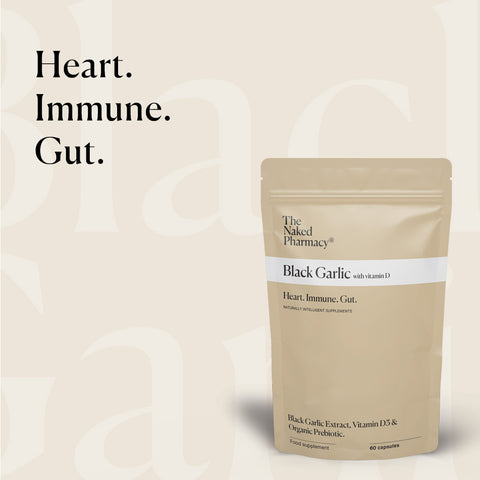
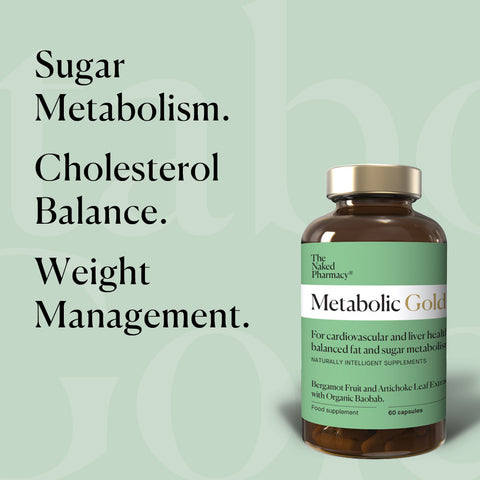
- AGED GARLIC can help shift unwanted fat from being dumped in the liver.
- VITAMIN D deficiencies are linked to NAFLD (Non Alcohol Fatty Liver Disease) : Vitamin D deficiency leads to the release of pro-inflammatory agents that can contribute to fatty liver disease
- BERGAMOT & ARTICHOKE EXTRACTS - Bergamot fruit extract has been shown to lower blood sugar, reduce inflammation, improve blood vessel activity and artichoke boosts your production of bile.





